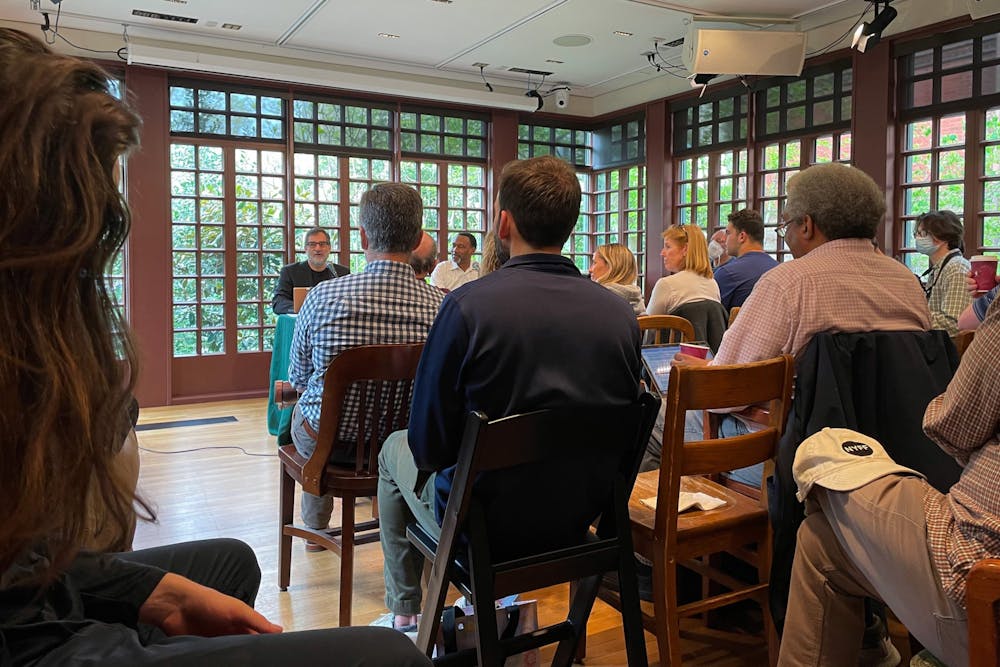Penn alumnus and former MLB player Doug Glanville is known for his impressive oratory and writing skills, both of which were on display during his reading and talk on Monday evening and his moderated interview on Tuesday morning at the Kelly Writers House.
Glanville played for Penn baseball from 1989-1991, during which time the team garnered two Eastern Intercollegiate Baseball League Championships. He then transitioned into the MLB, where he played on three different teams over the course of eight seasons. Since his time in the big leagues, Glanville has gone on to become an outspoken voice on the game through his writings for ESPN, The New York Times, and Time about such topics as PEDs and the Houston Astros sign-stealing scandal.
On Monday and Tuesday, Glanville spoke to a group of students and community members as part of his visit to Penn this week, which included checking out Penn baseball's game against Brown. Building off of Monday, where Glanville performed a reading of his essay "A Hole in Your Swing," Tuesday’s event was a conversation and interview, led by professor Al Filreis. Glanville eloquently answered questions — first from professor Filreis, and then from the audience — on a wide range of topics, from diversity to coaching his kid's tee-ball team.
Glanville began by speaking at length about the importance of diversity in today's MLB, both with regards to players, and for teams' hiring managers and front-office employees. He detailed the negative impact of certain biases that affected his career that are still present in today's game. One noteworthy example he gave was that many labeled him as a cerebral player who thought too much due to his Ivy League degree. By removing these biases, Glanville suggested that teams will become more diverse, leading to success both on and off the field.
To demonstrate the importance of diversity, he brought up the example of Mariano Rivera, the great Yankees closer in the 1990s and 2000s. When Rivera was retiring, he spent time in his final season meeting with and getting to know the people behind the scenes who made the game happen, such as the culinary staff and grounds crew. By reaching out to people in roles usually distant from the field, Rivera gained a greater understanding of the people who make up a team. Similarly, teams must be intimate, Glanville said, to give players a chance to cooperate through differences.
The conversation then transitioned to the importance of playing clean, something that Glanville has long been an advocate for. He talked about his time on the Chicago Cubs, when general manager Larry Himes told a group of rookies to be more like his star player, Sammy Sosa, and “get some swagger.” Glanville then explained how he is anti-swagger.
“You need a certain [level of] confidence, for sure, to do anything and at this major league level,” he said. “The best players on earth are trying to get you out — you definitely need confidence. Swagger is something I think about when there is confidence, but also the line of arrogance that gets crossed, and you start to be not such a great teammate and not treat fans so well.”
For Glanville, this pressure to be more like Sosa acted as a negative. By attaching success to some external attribute, which was achieved through illegal methods, it encouraged players to take shortcuts.
RELATED
'A player perspective': Penn baseball alumnus Doug Glanville on his move from player to analyst
Jake Cousins becomes first Penn alum to pitch in MLB playoffs since 1905
“It rubbed me wrong immediately at that moment,” Glanville said. “I’m not Schwarzenegger by any means. It is like extolling the virtues achieved through shortcuts. My father always said ‘shortcuts lead to long cuts.’”
The event finished with the attendees having the chance for Glanville to sign copies of his new book, "The Game from Where I Stand: From Batting Practice to the Clubhouse to the Best Breakfast on the Road, an Inside View of a Ballplayer's Life."









